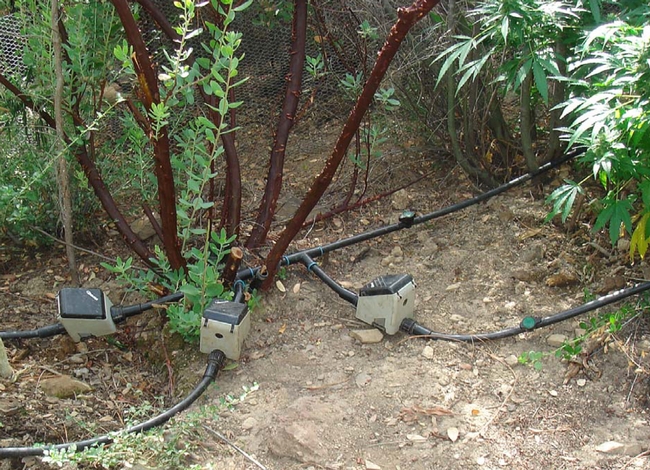Pollute, poach, dewater: Legacies of illicit cannabis grows
While the legality of California’s medical marijuana dispensaries is being debated in courtrooms, a UC Cooperative Extension forestry and wildlands ecology advisor says there are a number of issues related to the unregulated land-use practices of illicit cannabis growing that have not been addressed.
“As a forest ecologist, I spend a lot of time outdoors, and I talk to thousands of people every year about forest-related subject matter,” says Greg Giusti. “And you can’t talk to anybody today on the North Coast without the topic of cannabis growing and cannabis impacts on land coming up.”
In Lake and Mendocino counties, Giusti performs research and shares information with public agencies and private landowners in relation to forest management and freshwater ecology on behalf of UC Cooperative Extension. Marijuana farming is not a topic that Giusti ever intended to address.
Effects on natural resources
Most of the data available about illicit cannabis grows is based on drug enforcement actions, specifically how many sites were busted and how many plants or pounds of plant material were seized. Giusti has gathered photographs and anecdotal evidence of the effects on natural resources of commercial-scale marijuana grows operated illicitly on public and private lands.
Some of the effects he has documented:
- illegal water controls (including dams, stream diversion and water storage)
- water pollution from petroleum, pesticide and fertilizer products
- pesticides applied without permits
- pesticides, fertilizers and other chemicals left behind
- indiscriminate fish and wildlife killing (including poisoning, trapping and poaching for food)
- human trash and waste left after camping
“It’s not this green industry that people talk about,” Giusti says. “They’re diverting water, they’re polluting streams, and there’s a portion who are poaching. We’re also seeing all of the negative effects of unregulated road building, unregulated construction and unregulated human inhabitation for months and months out in the woods.”
Giusti explained that some cannabis growers divert water from streams to store in large water bladders, prematurely lowering stream levels during critical times in the year.
“It's illegal to do, but at the same time you can drive up and down Highway 101 and easily buy these huge bladders,” he said.
He notes that local businesses are selling compost by the ton, rodenticide by the pallet, thousands of pairs of clippers and turkey bags in lots of 100.
“Mainstream businesses are supporting this underground industry,” Giusti said. “You don’t have to be growing cannabis to be making money off of it.”
Raising awareness
In 2010, Giusti organized two community workshops in Lake County to address the impacts of illicit cannabis land-use on forest resources, for a combined attendance of nearly 400 community members. Giusti has shared his results with the board of supervisors for Lake and Mendocino counties, local news media, local foresters and the staff of the North Coast Regional Water Quality Control Board.
“My intention was to initiate a communitywide discussion to ask, ‘Is this what you want to happen to your forests?’” Giusti said. “Up until now it's been talked about in hushed tones, and I wanted to initiate a dialogue out loud. Everybody has been whispering about it.”
The presentation he developed for those meetings continues to generate discussion. Most recently, he has presented to the North Coast Water Quality Control Board staff and other agencies. He has shared photos collected for his presentation with Congressman Mike Thompson’s office as well.
“With the water quality control board, I had the opportunity to engage people whose job it is to protect the beneficial uses of water — and hopefully stimulate an internal dialogue so that they can continue the discussion after I leave their office,” he said. “There are other resource agencies that need to be involved, and county planning departments too. This is an unregulated land-use practice.”
This month, the Lake County Record-Bee ran an article by reporter Linda Williams with the headline “Thirsty marijuana grows suck Eel River dry,” which included some information presented at Giusti’s meetings.
“My efforts seem to be improving people's awareness,” he says. “The very thing I wanted to accomplish — creating broader dialogues — is happening.”
View Giusti's presentation: Illicit Cannabis Production on Forest and Wildland Resources
Comments:
Jen Carah



Don
Posted by Don Kemp on November 17, 2011 at 11:21 AM